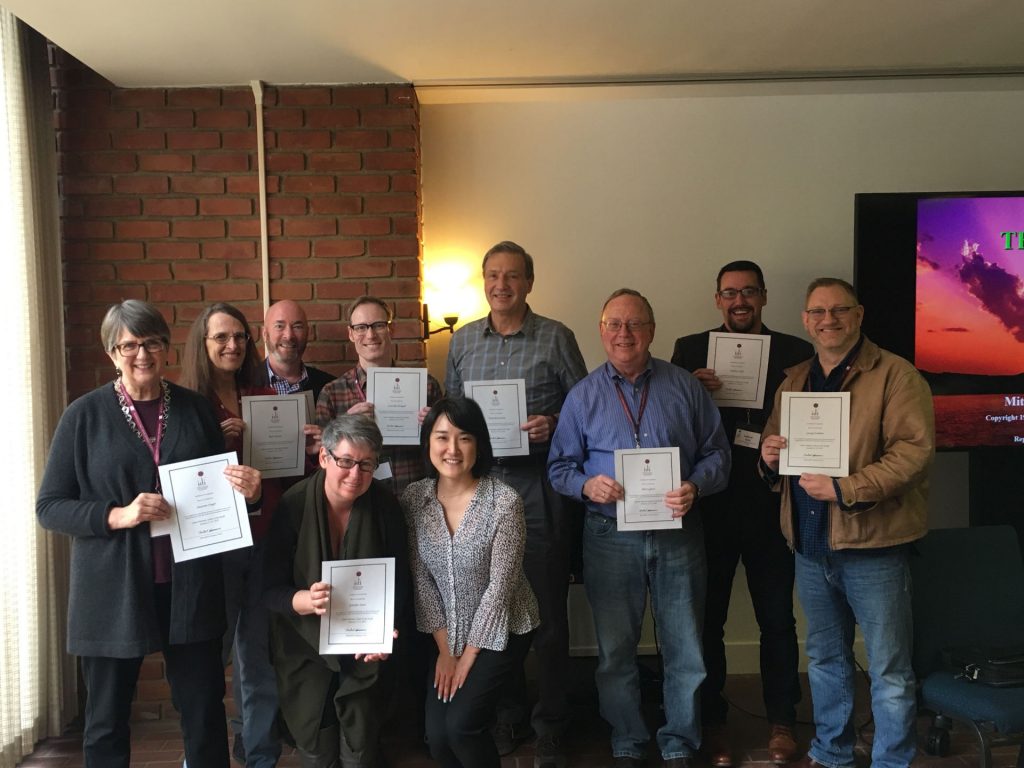Faculty, Administrators Build Intercultural Skills

In the brief respite between this month’s intersession, when 28 low-residence M.Div. students came to campus, and the start of the spring semester, CDSP’s leaders gathered on campus for two-and-a-half days to strengthen their ability to work in intercultural settings.
The ten-member group included eight faculty members, including the Very Rev. Dr. Mark Richardson, president and dean, along with the Rev. John F. Dwyer, chief operating officer, and the Rev. Andrew Hybl, dean of students.
The seminar with Akiko Maeker, who has a doctorate in organizational leadership, policy and development, taught participants to use a tool called the Intercultural Development Inventory (IDI). The IDI, which assesses intercultural competence, was recommended by the Rev. Arienne Davison, former canon for multicultural ministries in the Episcopal Diocese of Olympia.
During the training, participants used the IDI to assess their own intercultural competence and to develop goals and plans for building intercultural skills. They also learned how to administer the IDI to students and other CDSP community members.
The training, funded by grants from the Association of Theological Schools and Trinity Church Wall Street, strengthens the M.Div. curriculum that CDSP introduced last academic year, the Rev. Dr. Ruth Meyers, academic dean, said.
“The new curriculum emphasizes mission, discipleship, and evangelism, and makes explicit our commitment to forming leaders for ministry in a time of religious and cultural pluralism,” she said. “We believe that adopting an intercultural mindset in communication, pedagogy, decision-making, and conflict resolution within CDSP will help us prepare our graduates for more effective intercultural ministry in the church and world.”
Meyers also believes that the IDI training will extend beyond CDSP’s classrooms.
“Having senior administrators participate in the training is an important step in developing intercultural competence throughout the institution,” she says. “These skills can enable us to serve students more effectively and foster an institutional context that embraces diversity.”
Caroline McCall, director of field education and assistant professor of congregational studies, completed the IDI training in June so that she could begin using it in the field education program last fall.
“It is not about solutions to problems; it is about developing intercultural competence such that I am able to recognize and respond effectively to both similarities and differences among students,” she said. “As a result of my IDI profile and individual intercultural development plan, I have worked over the past six months to increase my capacity to adapt my expectations of student participation and writing.”
The Rev. Dr. William Stafford, visiting professor of church history, also said the IDI helped him take a fresh look at the writing he assigns.
“I found the IDI training stimulating and engaging,” he said. “It helped me focus my attention even more keenly on the ways my teaching needs to be adapted to the varied modes in which students from different cultural groups may learn. I’ve already revised some of my recommendations for students’ written work, to invite a wider range of personal and missional response at the end of the required academic papers.”
Now that her faculty colleagues have participated in the initial IDI training, McCall anticipates long-term benefits for CDSP. “This work will inevitably affect how each of us teaches, engages with students, and designs our coursework,” she said. “We want to maximize the benefit over the long term, so I am in the process of developing a grant proposal for us to continue to work with the IDI and to find ways of incorporating intercultural competence intentionally and holistically into our pedagogy and curriculum. This will make us all the more effective in preparing our graduates for inclusive and effective ministry.”

